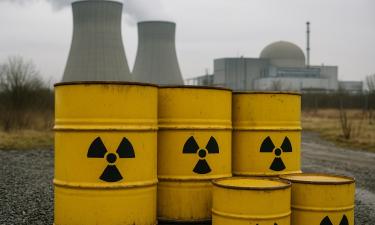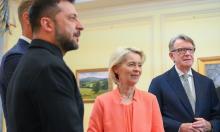George Bush presents Dalai Lama with highest civilian honor
President George W. Bush presented the Dalai Lama on Wednesday with the U.S. Congress' highest civilian honor and called on Chinese leaders to welcome the monk to Beijing.

The exiled spiritual head of Tibet's Buddhists by his side, Bush praised a man he called a "universal symbol of peace and tolerance, a shepherd of the faithful and a keeper of the flame for his people."
"Americans cannot look to the plight of the religiously oppressed and close our eyes or turn away," Bush said at the U.S. Capitol, where he personally handed the Dalai Lama the prestigious Congressional Gold Medal.
The Dalai Lama, chuckling as he stumbled over his remarks in English, said the award will bring "tremendous joy and encouragement to the Tibetan people" and thanked Bush for his "firm stand on religious freedom and democracy."
He said he supports the 2008 Beijing Olympics in the hopes China would become a more open and tolerant country. He also addressed Chinese suspicions of his advocacy for Tibet, saying "I have no hidden agenda."
China reviles the 72-year-old monk as a Tibetan separatist and vehemently protested the elaborate public ceremony. But at a news conference earlier in the day, Bush said he did not think that his attendance at the ceremony would damage U.S. relations with China.
"I support religious freedom; he supports religious freedom. ... I want to honor this man," Bush told reporters at the White House. "I have consistently told the Chinese that religious freedom is in their nation's interest."
Bush and the Dalai Lama listened as top U.S. lawmakers lined up to laud the Buddhist leader and criticize China.
Democratic Rep. Tom Lantos, the chairman of the House Foreign Affairs Committee, advised China that inviting the Dalai Lama for talks over Tibet's future will help make the 2008 Olympics a success.
"Let this man of peace visit Beijing," Lantos said as the crowd and Bush applauded. "He is not a splittist. He merely wants the religious and cultural autonomy for his own people that they so richly deserve."
The Dalai Lama smiled and nodded at people in the crowd throughout the ceremony in the majestic Capitol Rotunda; huge murals of important U.S. events loomed behind him. The domed room was packed with people, with a riser of news photographers that ran four rows deep.
On Tuesday, however, the Bush administration took pains to keep a private meeting with the president and the Dalai Lama from further infuriating China: no media access, not even a handout photo.
It was a delicate bit of diplomatic balancing. Bush wants to ease anger in China, a growing economic and military powerhouse that the United States needs to manage nuclear standoffs with Iran and North Korea. He also wants to be seen as a champion of religious freedom and human rights.
The Dalai Lama is lauded in much of the world as a figure of moral authority, but Beijing demonizes the 1989 Nobel Peace Prize laureate and claims he seeks to destroy China's sovereignty by pushing for independence for Tibet.
The Dalai Lama says he wants "real autonomy" for Tibet, not independence. He is immensely popular in the Himalayan region, which China has ruled with a heavy hand since its communist-led forces invaded in 1951. He has lived with followers in exile in India since fleeing Chinese soldiers in Tibet in 1959.
China has demanded that the United States cancel this week's celebrations. Chinese Foreign Minister Yang Jiechi in Beijing said the events "seriously wounded the feelings of the Chinese people and interfered with China's internal affairs."
U.S. lawmakers regularly criticize Beijing for human rights abuses and a massive military buildup and claim that China ignores abuse by unsavory foreign governments in Sudan and Myanmar in its pursuit of energy and business deals.
The Bush administration also finds fault with China but is usually more measured as it seeks to manage a booming trade relationship and a desire to enlist Chinese cooperation in world affairs.
Subscribe to Pravda.Ru Telegram channel, Facebook, RSS!




